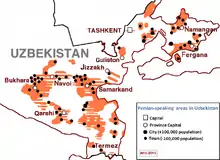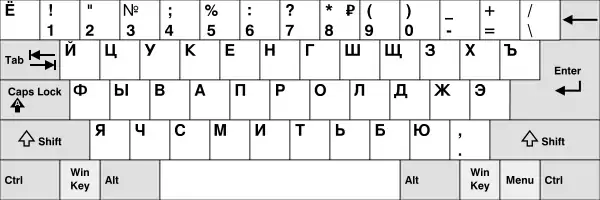Languages of Uzbekistan
Most languages of Uzbekistan are Turkic languages. However, the two languages of government are the Uzbek language as the first and state language, and Russian as the interethnic and public institutions language.[2]
| Languages of Uzbekistan | |
|---|---|
| Official | Uzbek[1] |
| Significant | Russian (interethnic) |
| Regional | Karakalpak (Republic of Karakalpakstan) |
| Minority | Dungan, Erzya, Koryo-mar, Kazakh, Kyrgyz, Southern Uzbek, Tajik, Tatar |
| Keyboard layout | |
Turkic languages
The Uzbek language is one of the Turkic languages close to Uyghur language and both of them belong to the Karluk languages branch of the Turkic language family. Uzbek language is the only official state language,[3] and since 1992 is officially written in the Latin alphabet.
Karakalpak, is also a Turkic language but closer to Kazakh, is spoken in the Republic of Karakalpakstan and has an official status there. This language is spoken by half a million people. More than 800,000 people also speak the Kazakh language.
Before the 1920s, the written language of Uzbeks was called Turki (known to Western scholars as Chagatai) and used the Nastaʿlīq script. In 1926 the Latin alphabet was introduced and went through several revisions throughout the 1930s. Finally, in 1940, the Cyrillic alphabet was introduced by Soviet authorities and was used until the fall of Soviet Union. In 1993 Uzbekistan shifted back to the Latin script (Uzbek alphabet), which was modified in 1996 and has been taught in schools since 2000. Schools, colleges, and universities teach only in Latin script. At the same time, in the country for Uzbek language is also used officially abolished the Cyrillic alphabet. Cyrillic is used in a number of popular newspapers and websites. Some of the text on the TV on some channels is duplicated in the Cyrillic alphabet. Cyrillic is popular with the older generation of Uzbeks who grew up on this alphabet.[4]
Indo-European languages

Although the Russian language is not formally declared an official language in the country, it is widely used in all fields, including official documents. It, along with Uzbek, are the permissible languages of notary institutions and registry offices.[5] Thus, the Russian language is the de facto second official language in Uzbekistan. Russian is an important language for interethnic communication, especially in the cities, including much day-to-day technical, scientific, governmental and business use. The country is also home to approximately one million people whose native language is Russian.[6][7][8][9][10] The local dialect is Uzbekistani Russian.
The Tajik language (a variety of Persian) is widespread in the cities of Bukhara and Samarkand because of their relatively large population of ethnic Tajiks (official 1,5 million).[11] It is also found in large pockets in Kasansay, Chust, Rishtan and Sokh in Ferghana Valley, as well as in Burchmulla, Ahangaran, Baghistan in the middle Syr Darya district, and finally in, Shahrisabz, Qarshi, Kitab and the river valleys of Kafiringan and Chaganian, forming altogether, approximately 10–15% of the population of Uzbekistan.[12]
Laws
There are no language requirements for the citizenship of Uzbekistan.[9]
References
- "Constitution of the Republic of Uzbekistan". constitution.uz. constitution.uz. Retrieved 1 September 2020.
- "Law of the Republic of Uzbekistan "On Official Language"" (PDF). Refworld. Retrieved 3 October 2016.
- Mansurov, Nasim (8 December 1992). "Constitution of the Republic of Uzbekistan". Umid.uz. Archived from the original on 17 January 2012. Retrieved 2 May 2010.
- Kamp, Marianne (2008). The New Woman in Uzbekistan: Islam, Modernity, and Unveiling Under Communism. University of Washington Press. ISBN 0-295-98819-3. Archived from the original on 5 April 2015.
- "Law of the Republic of Uzbekistan "On Official Language"" (PDF). Refworld. Retrieved 3 October 2016.
- Юрий Подпоренко (2001). "Бесправен, но востребован. Русский язык в Узбекистане". Дружба Народов. Archived from the original on 13 May 2016. Retrieved 27 May 2016.
- Евгений Абдуллаев (2009). "Русский язык: жизнь после смерти. Язык, политика и общество в современном Узбекистане". Неприкосновенный запас. Archived from the original on 23 June 2016. Retrieved 27 May 2016.
- А. Е. Пьянов. "СТАТУС РУССКОГО ЯЗЫКА В СТРАНАХ СНГ". 2011. Archived from the original on 28 May 2016. Retrieved 27 May 2016.
- Languages in Uzbekistan Archived 11 September 2016 at the Wayback Machine – Facts and Details
- "Uzbekistan's Russian-Language Conundrum". Eurasianet.org. 19 September 2006. Archived from the original on 29 November 2010. Retrieved 2 May 2010.
- Richard Foltz (1996). "The Tajiks of Uzbekistan". Central Asian Survey. 15 (2): 213–216. doi:10.1080/02634939608400946.
- Cordell, Karl (1998) Ethnicity and Democratisation in the New Europe, Routledge, ISBN 0415173124, p. 201: "Consequently, the number of citizens who regard themselves as Tajiks is difficult to determine. Tajikis within and outside of the republic, Samarkand State University (SamGU) academic and international commentators suggest that there may be between six and seven million Tajiks in Uzbekistan, constituting 30% of the republic's 22 million population, rather than the official figure of 4.7% (Foltz 1996;213; Carlisle 1995:88).
